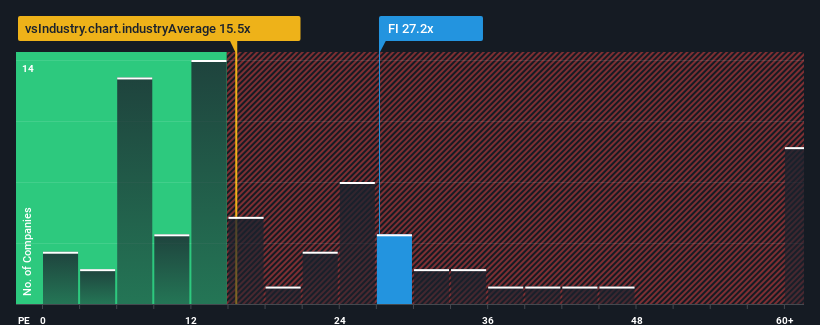- United States
- /
- Diversified Financial
- /
- NYSE:FI
Why We're Not Concerned Yet About Fiserv, Inc.'s (NYSE:FI) 25% Share Price Plunge
To the annoyance of some shareholders, Fiserv, Inc. (NYSE:FI) shares are down a considerable 25% in the last month, which continues a horrid run for the company. The last month has meant the stock is now only up 4.1% during the last year.
In spite of the heavy fall in price, given close to half the companies in the United States have price-to-earnings ratios (or "P/E's") below 17x, you may still consider Fiserv as a stock to avoid entirely with its 27.2x P/E ratio. However, the P/E might be quite high for a reason and it requires further investigation to determine if it's justified.
Fiserv's earnings growth of late has been pretty similar to most other companies. It might be that many expect the mediocre earnings performance to strengthen positively, which has kept the P/E from falling. You'd really hope so, otherwise you're paying a pretty hefty price for no particular reason.
See our latest analysis for Fiserv

How Is Fiserv's Growth Trending?
The only time you'd be truly comfortable seeing a P/E as steep as Fiserv's is when the company's growth is on track to outshine the market decidedly.
Taking a look back first, we see that the company managed to grow earnings per share by a handy 5.7% last year. The latest three year period has also seen an excellent 127% overall rise in EPS, aided somewhat by its short-term performance. Therefore, it's fair to say the earnings growth recently has been superb for the company.
Turning to the outlook, the next three years should generate growth of 28% per year as estimated by the analysts watching the company. That's shaping up to be materially higher than the 10% per year growth forecast for the broader market.
With this information, we can see why Fiserv is trading at such a high P/E compared to the market. Apparently shareholders aren't keen to offload something that is potentially eyeing a more prosperous future.
What We Can Learn From Fiserv's P/E?
Even after such a strong price drop, Fiserv's P/E still exceeds the rest of the market significantly. We'd say the price-to-earnings ratio's power isn't primarily as a valuation instrument but rather to gauge current investor sentiment and future expectations.
We've established that Fiserv maintains its high P/E on the strength of its forecast growth being higher than the wider market, as expected. At this stage investors feel the potential for a deterioration in earnings isn't great enough to justify a lower P/E ratio. Unless these conditions change, they will continue to provide strong support to the share price.
You should always think about risks. Case in point, we've spotted 2 warning signs for Fiserv you should be aware of.
If P/E ratios interest you, you may wish to see this free collection of other companies with strong earnings growth and low P/E ratios.
New: AI Stock Screener & Alerts
Our new AI Stock Screener scans the market every day to uncover opportunities.
• Dividend Powerhouses (3%+ Yield)
• Undervalued Small Caps with Insider Buying
• High growth Tech and AI Companies
Or build your own from over 50 metrics.
Have feedback on this article? Concerned about the content? Get in touch with us directly. Alternatively, email editorial-team (at) simplywallst.com.
This article by Simply Wall St is general in nature. We provide commentary based on historical data and analyst forecasts only using an unbiased methodology and our articles are not intended to be financial advice. It does not constitute a recommendation to buy or sell any stock, and does not take account of your objectives, or your financial situation. We aim to bring you long-term focused analysis driven by fundamental data. Note that our analysis may not factor in the latest price-sensitive company announcements or qualitative material. Simply Wall St has no position in any stocks mentioned.
About NYSE:FI
Fiserv
Provides payments and financial services technology solutions in the United States, Europe, the Middle East and Africa, Latin America, the Asia-Pacific, and internationally.
Fair value with mediocre balance sheet.
Similar Companies
Market Insights
Community Narratives



